Leadership in Global Context: Ethical Analysis and Business Impact
VerifiedAdded on 2022/11/19
|7
|1765
|71
Report
AI Summary
This report provides a comprehensive analysis of Daniel E. Palmer's article, "Business Leadership: Three Levels of Ethical Analysis." The report summarizes the author's key arguments, emphasizing the critical role of ethics in leadership within a global context. It explores the ethical failures of businesses and the importance of ethical leadership for organizational success. The report examines Palmer's perspectives on ethical leadership, the purpose and audience of the article, the author's authority, the accuracy and reliability of the information, its objectivity, currency, and coverage. Furthermore, it identifies the most interesting takeaways from the article and discusses their relevance to business careers. The report highlights the significance of ethical considerations in leadership, particularly in fostering a positive market reputation and generating profits. The analysis includes a detailed evaluation of the article's strengths and limitations, providing a well-rounded assessment of its impact on leadership and business ethics.
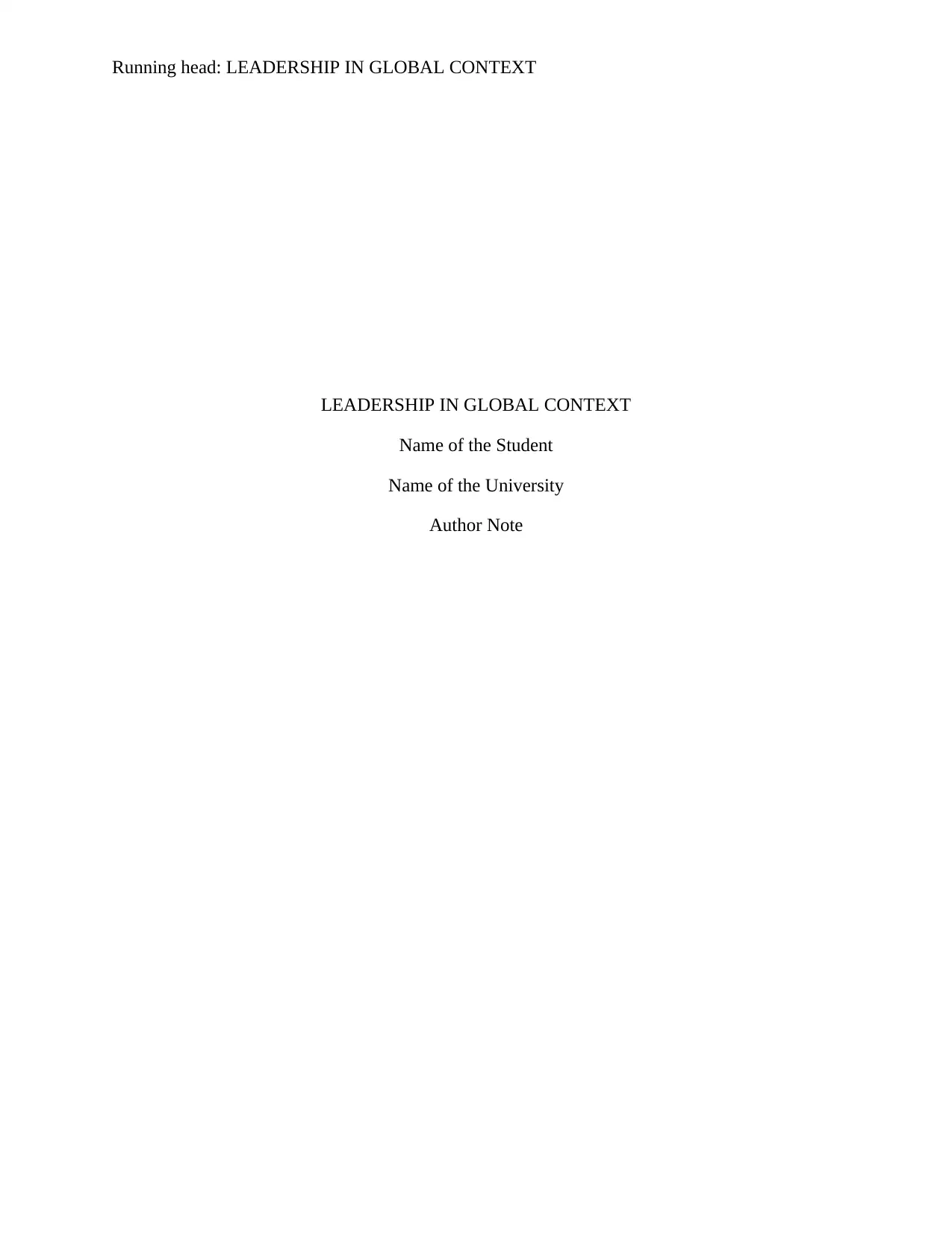
Running head: LEADERSHIP IN GLOBAL CONTEXT
LEADERSHIP IN GLOBAL CONTEXT
Name of the Student
Name of the University
Author Note
LEADERSHIP IN GLOBAL CONTEXT
Name of the Student
Name of the University
Author Note
Paraphrase This Document
Need a fresh take? Get an instant paraphrase of this document with our AI Paraphraser
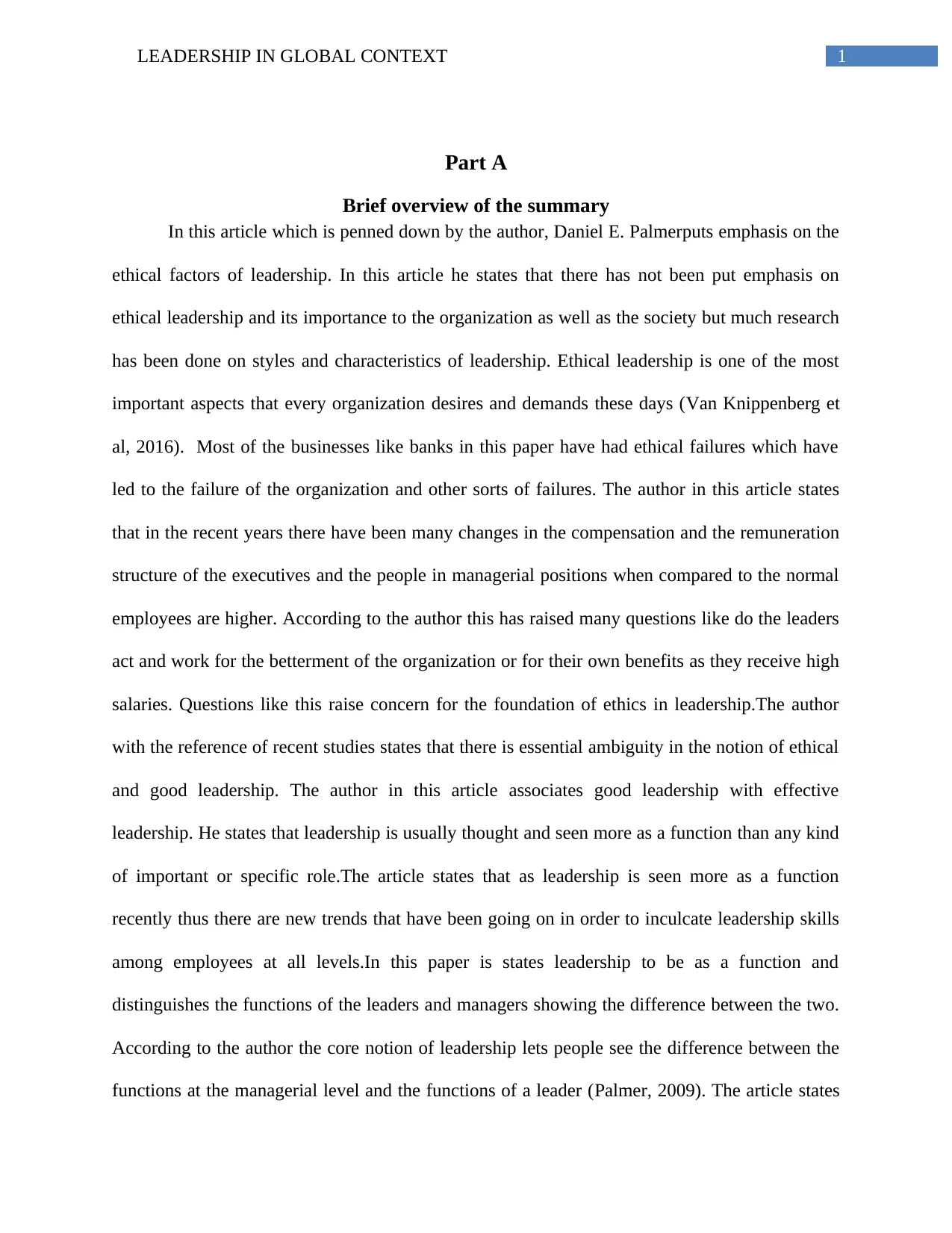
1LEADERSHIP IN GLOBAL CONTEXT
Part A
Brief overview of the summary
In this article which is penned down by the author, Daniel E. Palmerputs emphasis on the
ethical factors of leadership. In this article he states that there has not been put emphasis on
ethical leadership and its importance to the organization as well as the society but much research
has been done on styles and characteristics of leadership. Ethical leadership is one of the most
important aspects that every organization desires and demands these days (Van Knippenberg et
al, 2016). Most of the businesses like banks in this paper have had ethical failures which have
led to the failure of the organization and other sorts of failures. The author in this article states
that in the recent years there have been many changes in the compensation and the remuneration
structure of the executives and the people in managerial positions when compared to the normal
employees are higher. According to the author this has raised many questions like do the leaders
act and work for the betterment of the organization or for their own benefits as they receive high
salaries. Questions like this raise concern for the foundation of ethics in leadership.The author
with the reference of recent studies states that there is essential ambiguity in the notion of ethical
and good leadership. The author in this article associates good leadership with effective
leadership. He states that leadership is usually thought and seen more as a function than any kind
of important or specific role.The article states that as leadership is seen more as a function
recently thus there are new trends that have been going on in order to inculcate leadership skills
among employees at all levels.In this paper is states leadership to be as a function and
distinguishes the functions of the leaders and managers showing the difference between the two.
According to the author the core notion of leadership lets people see the difference between the
functions at the managerial level and the functions of a leader (Palmer, 2009). The article states
Part A
Brief overview of the summary
In this article which is penned down by the author, Daniel E. Palmerputs emphasis on the
ethical factors of leadership. In this article he states that there has not been put emphasis on
ethical leadership and its importance to the organization as well as the society but much research
has been done on styles and characteristics of leadership. Ethical leadership is one of the most
important aspects that every organization desires and demands these days (Van Knippenberg et
al, 2016). Most of the businesses like banks in this paper have had ethical failures which have
led to the failure of the organization and other sorts of failures. The author in this article states
that in the recent years there have been many changes in the compensation and the remuneration
structure of the executives and the people in managerial positions when compared to the normal
employees are higher. According to the author this has raised many questions like do the leaders
act and work for the betterment of the organization or for their own benefits as they receive high
salaries. Questions like this raise concern for the foundation of ethics in leadership.The author
with the reference of recent studies states that there is essential ambiguity in the notion of ethical
and good leadership. The author in this article associates good leadership with effective
leadership. He states that leadership is usually thought and seen more as a function than any kind
of important or specific role.The article states that as leadership is seen more as a function
recently thus there are new trends that have been going on in order to inculcate leadership skills
among employees at all levels.In this paper is states leadership to be as a function and
distinguishes the functions of the leaders and managers showing the difference between the two.
According to the author the core notion of leadership lets people see the difference between the
functions at the managerial level and the functions of a leader (Palmer, 2009). The article states
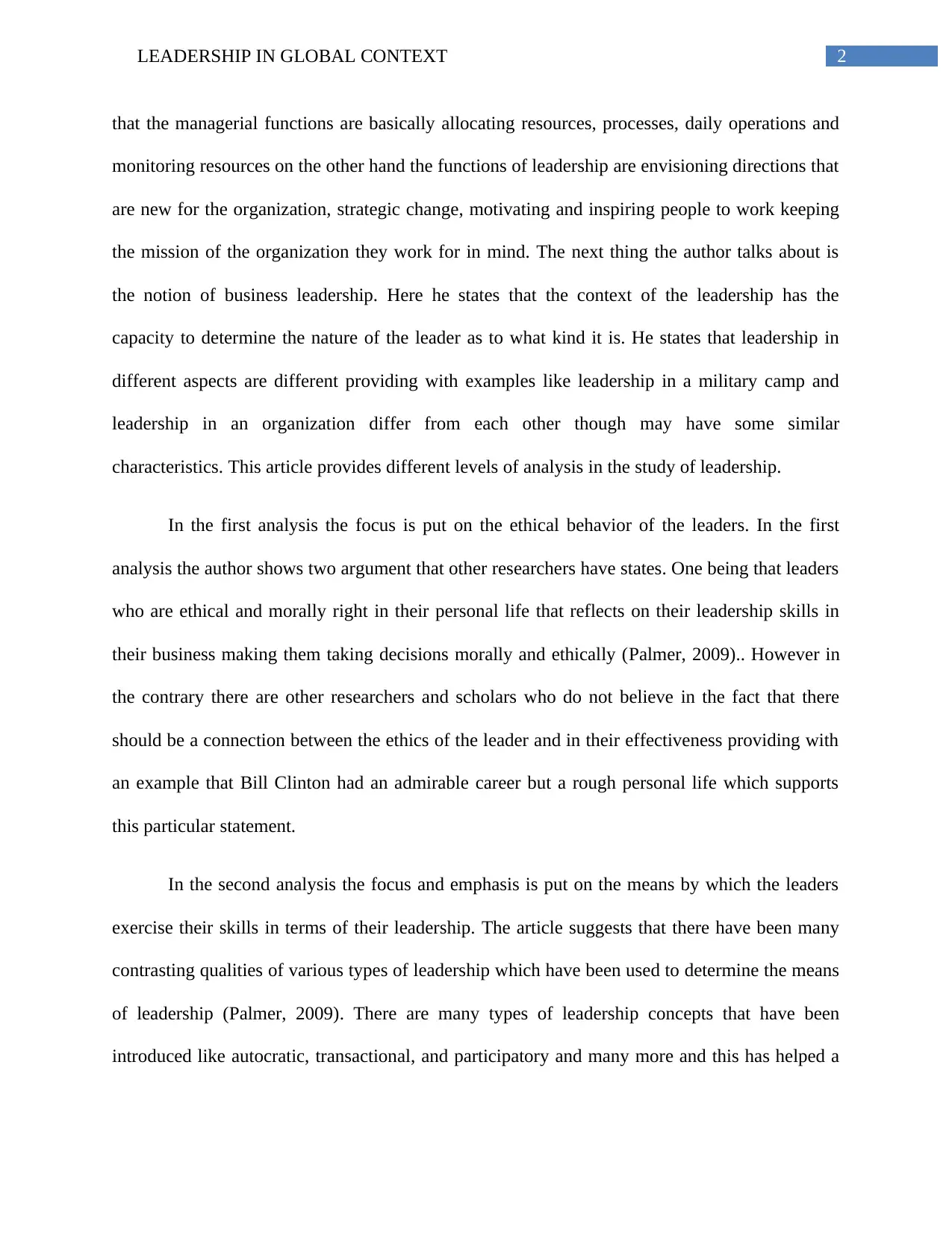
2LEADERSHIP IN GLOBAL CONTEXT
that the managerial functions are basically allocating resources, processes, daily operations and
monitoring resources on the other hand the functions of leadership are envisioning directions that
are new for the organization, strategic change, motivating and inspiring people to work keeping
the mission of the organization they work for in mind. The next thing the author talks about is
the notion of business leadership. Here he states that the context of the leadership has the
capacity to determine the nature of the leader as to what kind it is. He states that leadership in
different aspects are different providing with examples like leadership in a military camp and
leadership in an organization differ from each other though may have some similar
characteristics. This article provides different levels of analysis in the study of leadership.
In the first analysis the focus is put on the ethical behavior of the leaders. In the first
analysis the author shows two argument that other researchers have states. One being that leaders
who are ethical and morally right in their personal life that reflects on their leadership skills in
their business making them taking decisions morally and ethically (Palmer, 2009).. However in
the contrary there are other researchers and scholars who do not believe in the fact that there
should be a connection between the ethics of the leader and in their effectiveness providing with
an example that Bill Clinton had an admirable career but a rough personal life which supports
this particular statement.
In the second analysis the focus and emphasis is put on the means by which the leaders
exercise their skills in terms of their leadership. The article suggests that there have been many
contrasting qualities of various types of leadership which have been used to determine the means
of leadership (Palmer, 2009). There are many types of leadership concepts that have been
introduced like autocratic, transactional, and participatory and many more and this has helped a
that the managerial functions are basically allocating resources, processes, daily operations and
monitoring resources on the other hand the functions of leadership are envisioning directions that
are new for the organization, strategic change, motivating and inspiring people to work keeping
the mission of the organization they work for in mind. The next thing the author talks about is
the notion of business leadership. Here he states that the context of the leadership has the
capacity to determine the nature of the leader as to what kind it is. He states that leadership in
different aspects are different providing with examples like leadership in a military camp and
leadership in an organization differ from each other though may have some similar
characteristics. This article provides different levels of analysis in the study of leadership.
In the first analysis the focus is put on the ethical behavior of the leaders. In the first
analysis the author shows two argument that other researchers have states. One being that leaders
who are ethical and morally right in their personal life that reflects on their leadership skills in
their business making them taking decisions morally and ethically (Palmer, 2009).. However in
the contrary there are other researchers and scholars who do not believe in the fact that there
should be a connection between the ethics of the leader and in their effectiveness providing with
an example that Bill Clinton had an admirable career but a rough personal life which supports
this particular statement.
In the second analysis the focus and emphasis is put on the means by which the leaders
exercise their skills in terms of their leadership. The article suggests that there have been many
contrasting qualities of various types of leadership which have been used to determine the means
of leadership (Palmer, 2009). There are many types of leadership concepts that have been
introduced like autocratic, transactional, and participatory and many more and this has helped a
⊘ This is a preview!⊘
Do you want full access?
Subscribe today to unlock all pages.

Trusted by 1+ million students worldwide
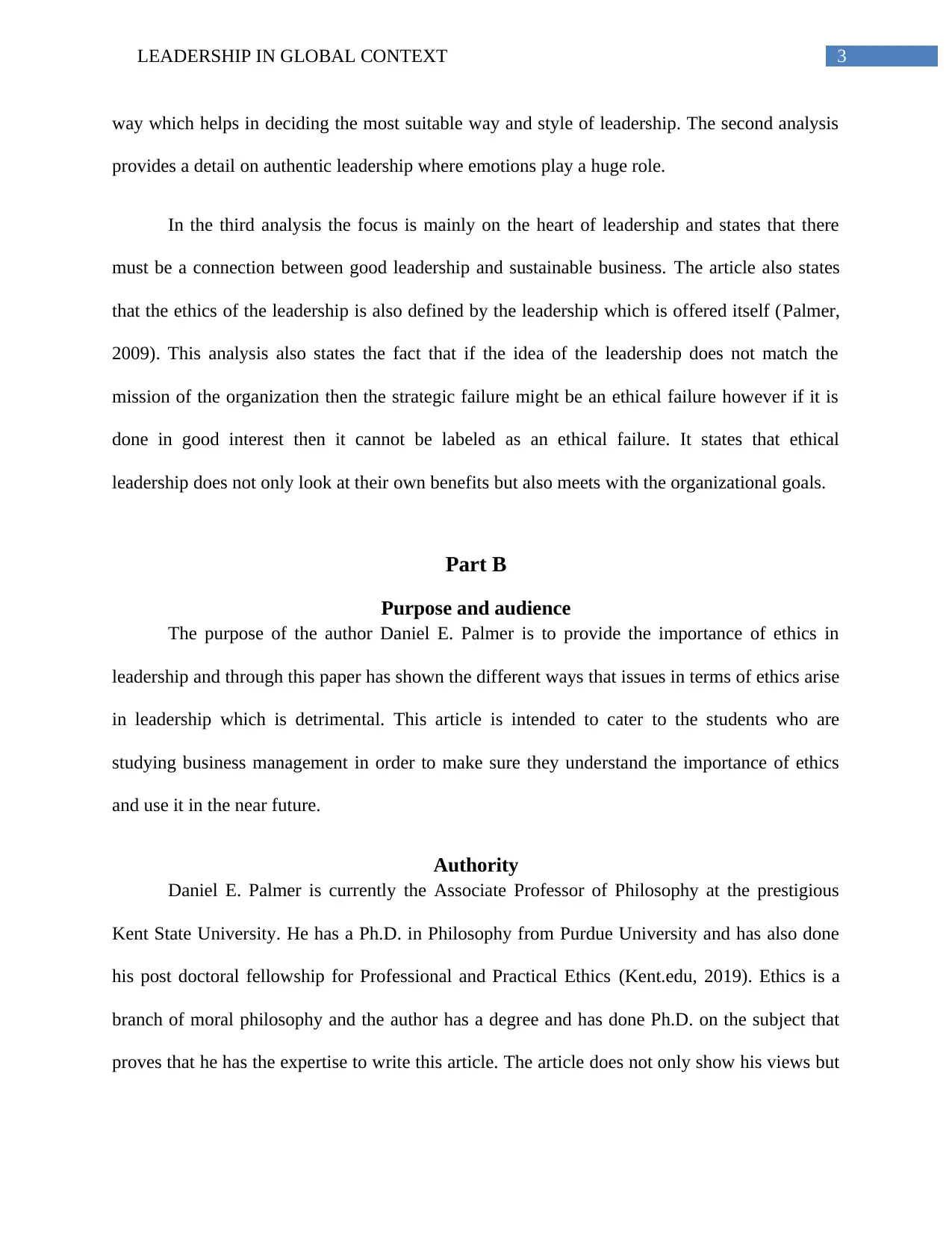
3LEADERSHIP IN GLOBAL CONTEXT
way which helps in deciding the most suitable way and style of leadership. The second analysis
provides a detail on authentic leadership where emotions play a huge role.
In the third analysis the focus is mainly on the heart of leadership and states that there
must be a connection between good leadership and sustainable business. The article also states
that the ethics of the leadership is also defined by the leadership which is offered itself (Palmer,
2009). This analysis also states the fact that if the idea of the leadership does not match the
mission of the organization then the strategic failure might be an ethical failure however if it is
done in good interest then it cannot be labeled as an ethical failure. It states that ethical
leadership does not only look at their own benefits but also meets with the organizational goals.
Part B
Purpose and audience
The purpose of the author Daniel E. Palmer is to provide the importance of ethics in
leadership and through this paper has shown the different ways that issues in terms of ethics arise
in leadership which is detrimental. This article is intended to cater to the students who are
studying business management in order to make sure they understand the importance of ethics
and use it in the near future.
Authority
Daniel E. Palmer is currently the Associate Professor of Philosophy at the prestigious
Kent State University. He has a Ph.D. in Philosophy from Purdue University and has also done
his post doctoral fellowship for Professional and Practical Ethics (Kent.edu, 2019). Ethics is a
branch of moral philosophy and the author has a degree and has done Ph.D. on the subject that
proves that he has the expertise to write this article. The article does not only show his views but
way which helps in deciding the most suitable way and style of leadership. The second analysis
provides a detail on authentic leadership where emotions play a huge role.
In the third analysis the focus is mainly on the heart of leadership and states that there
must be a connection between good leadership and sustainable business. The article also states
that the ethics of the leadership is also defined by the leadership which is offered itself (Palmer,
2009). This analysis also states the fact that if the idea of the leadership does not match the
mission of the organization then the strategic failure might be an ethical failure however if it is
done in good interest then it cannot be labeled as an ethical failure. It states that ethical
leadership does not only look at their own benefits but also meets with the organizational goals.
Part B
Purpose and audience
The purpose of the author Daniel E. Palmer is to provide the importance of ethics in
leadership and through this paper has shown the different ways that issues in terms of ethics arise
in leadership which is detrimental. This article is intended to cater to the students who are
studying business management in order to make sure they understand the importance of ethics
and use it in the near future.
Authority
Daniel E. Palmer is currently the Associate Professor of Philosophy at the prestigious
Kent State University. He has a Ph.D. in Philosophy from Purdue University and has also done
his post doctoral fellowship for Professional and Practical Ethics (Kent.edu, 2019). Ethics is a
branch of moral philosophy and the author has a degree and has done Ph.D. on the subject that
proves that he has the expertise to write this article. The article does not only show his views but
Paraphrase This Document
Need a fresh take? Get an instant paraphrase of this document with our AI Paraphraser
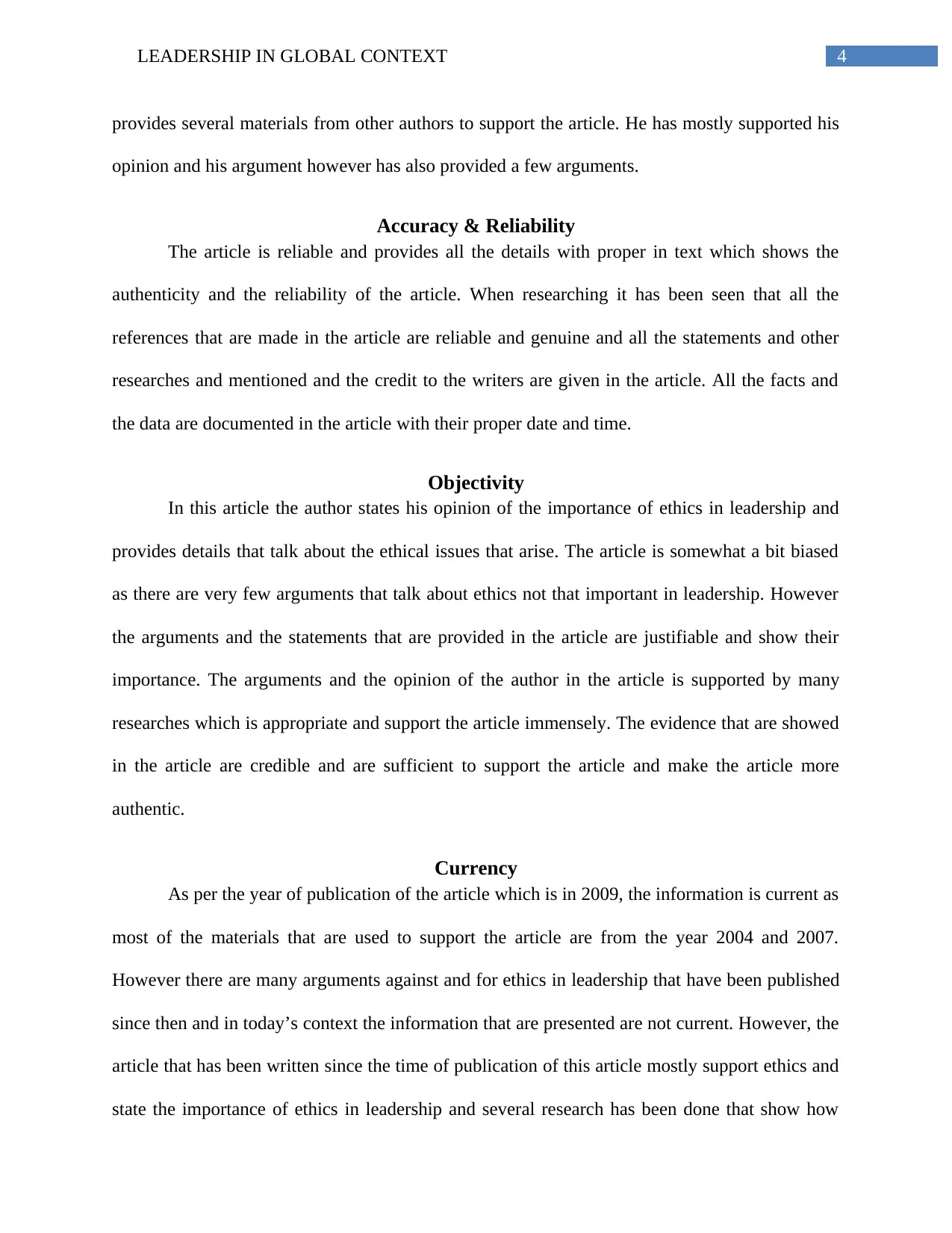
4LEADERSHIP IN GLOBAL CONTEXT
provides several materials from other authors to support the article. He has mostly supported his
opinion and his argument however has also provided a few arguments.
Accuracy & Reliability
The article is reliable and provides all the details with proper in text which shows the
authenticity and the reliability of the article. When researching it has been seen that all the
references that are made in the article are reliable and genuine and all the statements and other
researches and mentioned and the credit to the writers are given in the article. All the facts and
the data are documented in the article with their proper date and time.
Objectivity
In this article the author states his opinion of the importance of ethics in leadership and
provides details that talk about the ethical issues that arise. The article is somewhat a bit biased
as there are very few arguments that talk about ethics not that important in leadership. However
the arguments and the statements that are provided in the article are justifiable and show their
importance. The arguments and the opinion of the author in the article is supported by many
researches which is appropriate and support the article immensely. The evidence that are showed
in the article are credible and are sufficient to support the article and make the article more
authentic.
Currency
As per the year of publication of the article which is in 2009, the information is current as
most of the materials that are used to support the article are from the year 2004 and 2007.
However there are many arguments against and for ethics in leadership that have been published
since then and in today’s context the information that are presented are not current. However, the
article that has been written since the time of publication of this article mostly support ethics and
state the importance of ethics in leadership and several research has been done that show how
provides several materials from other authors to support the article. He has mostly supported his
opinion and his argument however has also provided a few arguments.
Accuracy & Reliability
The article is reliable and provides all the details with proper in text which shows the
authenticity and the reliability of the article. When researching it has been seen that all the
references that are made in the article are reliable and genuine and all the statements and other
researches and mentioned and the credit to the writers are given in the article. All the facts and
the data are documented in the article with their proper date and time.
Objectivity
In this article the author states his opinion of the importance of ethics in leadership and
provides details that talk about the ethical issues that arise. The article is somewhat a bit biased
as there are very few arguments that talk about ethics not that important in leadership. However
the arguments and the statements that are provided in the article are justifiable and show their
importance. The arguments and the opinion of the author in the article is supported by many
researches which is appropriate and support the article immensely. The evidence that are showed
in the article are credible and are sufficient to support the article and make the article more
authentic.
Currency
As per the year of publication of the article which is in 2009, the information is current as
most of the materials that are used to support the article are from the year 2004 and 2007.
However there are many arguments against and for ethics in leadership that have been published
since then and in today’s context the information that are presented are not current. However, the
article that has been written since the time of publication of this article mostly support ethics and
state the importance of ethics in leadership and several research has been done that show how
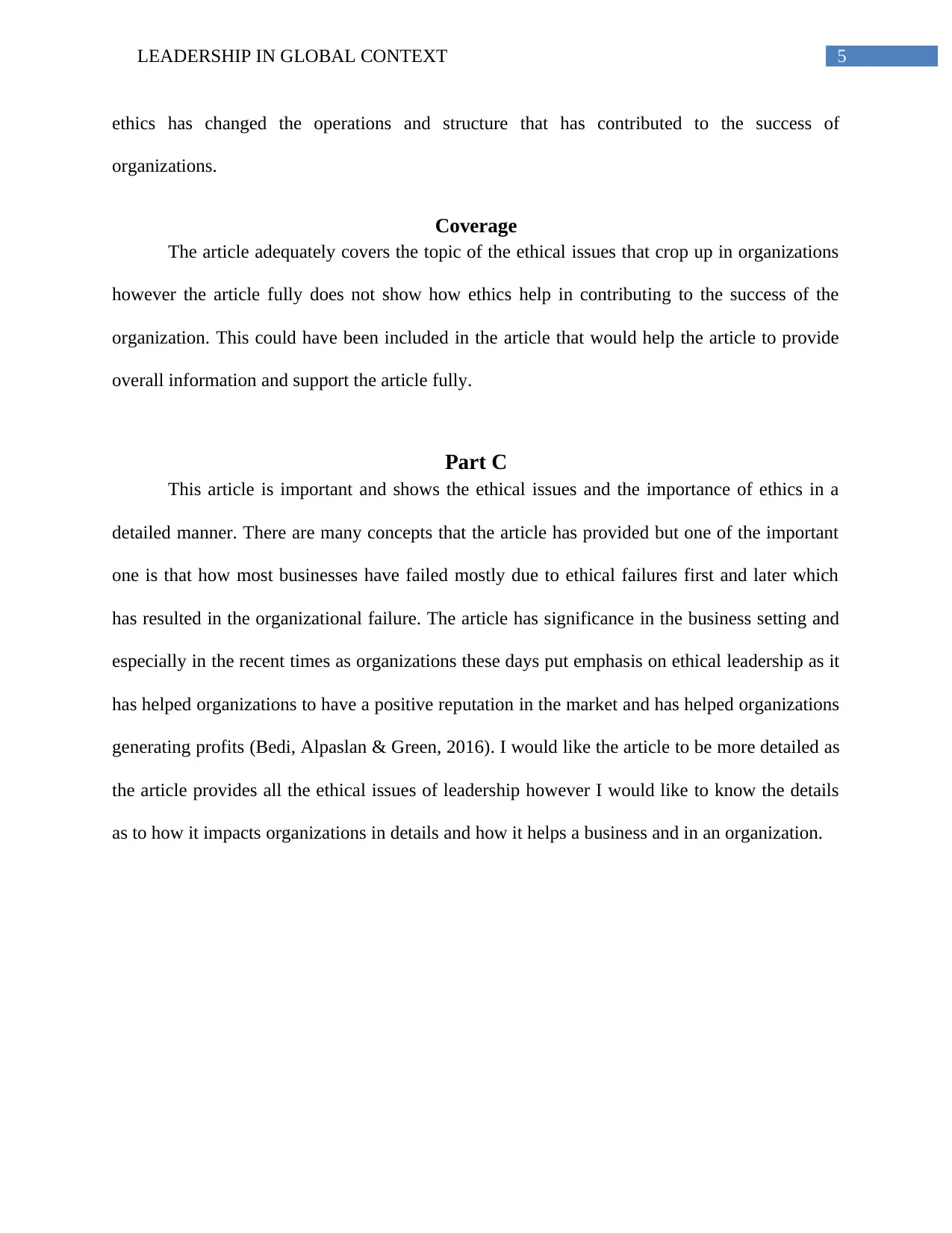
5LEADERSHIP IN GLOBAL CONTEXT
ethics has changed the operations and structure that has contributed to the success of
organizations.
Coverage
The article adequately covers the topic of the ethical issues that crop up in organizations
however the article fully does not show how ethics help in contributing to the success of the
organization. This could have been included in the article that would help the article to provide
overall information and support the article fully.
Part C
This article is important and shows the ethical issues and the importance of ethics in a
detailed manner. There are many concepts that the article has provided but one of the important
one is that how most businesses have failed mostly due to ethical failures first and later which
has resulted in the organizational failure. The article has significance in the business setting and
especially in the recent times as organizations these days put emphasis on ethical leadership as it
has helped organizations to have a positive reputation in the market and has helped organizations
generating profits (Bedi, Alpaslan & Green, 2016). I would like the article to be more detailed as
the article provides all the ethical issues of leadership however I would like to know the details
as to how it impacts organizations in details and how it helps a business and in an organization.
ethics has changed the operations and structure that has contributed to the success of
organizations.
Coverage
The article adequately covers the topic of the ethical issues that crop up in organizations
however the article fully does not show how ethics help in contributing to the success of the
organization. This could have been included in the article that would help the article to provide
overall information and support the article fully.
Part C
This article is important and shows the ethical issues and the importance of ethics in a
detailed manner. There are many concepts that the article has provided but one of the important
one is that how most businesses have failed mostly due to ethical failures first and later which
has resulted in the organizational failure. The article has significance in the business setting and
especially in the recent times as organizations these days put emphasis on ethical leadership as it
has helped organizations to have a positive reputation in the market and has helped organizations
generating profits (Bedi, Alpaslan & Green, 2016). I would like the article to be more detailed as
the article provides all the ethical issues of leadership however I would like to know the details
as to how it impacts organizations in details and how it helps a business and in an organization.
⊘ This is a preview!⊘
Do you want full access?
Subscribe today to unlock all pages.

Trusted by 1+ million students worldwide
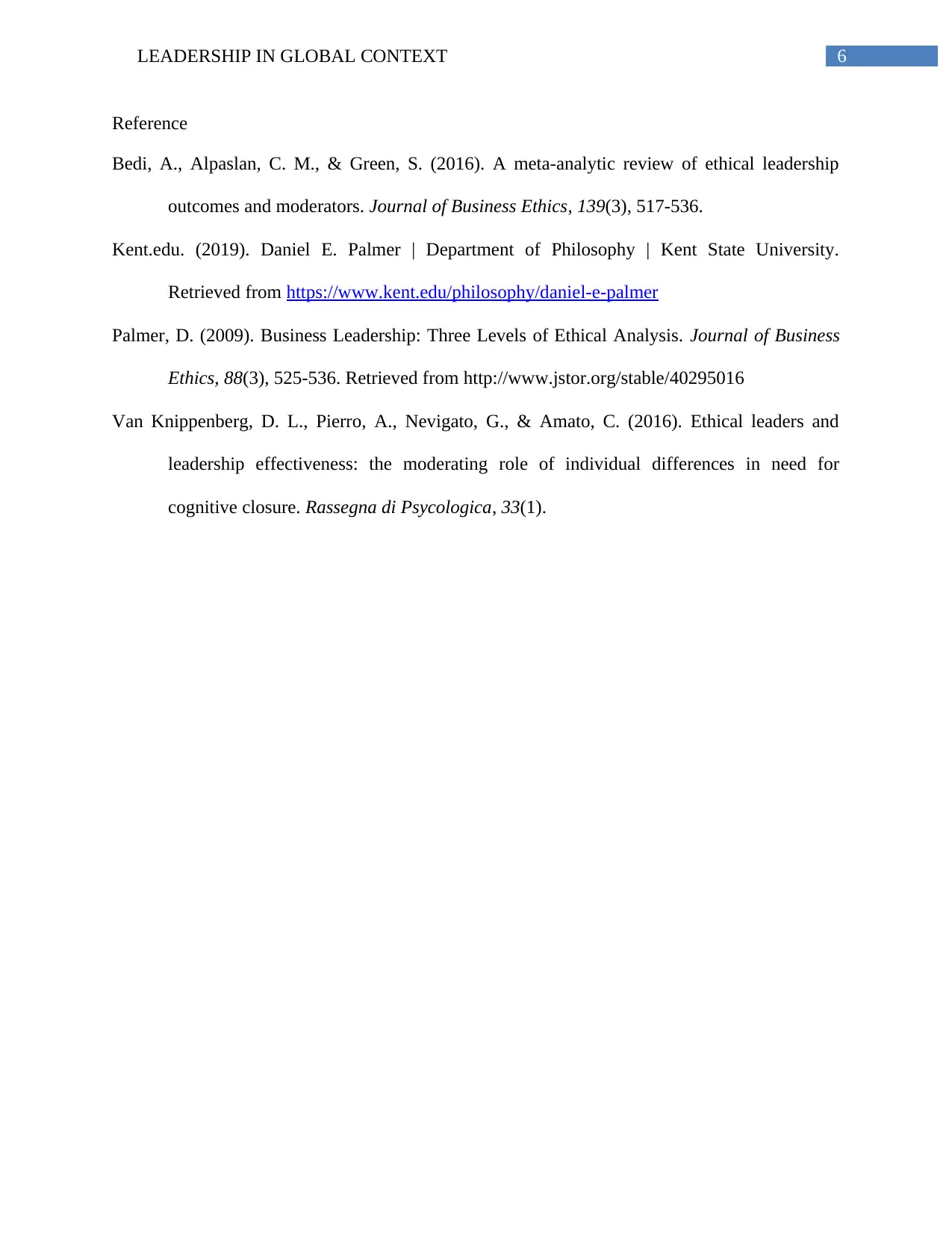
6LEADERSHIP IN GLOBAL CONTEXT
Reference
Bedi, A., Alpaslan, C. M., & Green, S. (2016). A meta-analytic review of ethical leadership
outcomes and moderators. Journal of Business Ethics, 139(3), 517-536.
Kent.edu. (2019). Daniel E. Palmer | Department of Philosophy | Kent State University.
Retrieved from https://www.kent.edu/philosophy/daniel-e-palmer
Palmer, D. (2009). Business Leadership: Three Levels of Ethical Analysis. Journal of Business
Ethics, 88(3), 525-536. Retrieved from http://www.jstor.org/stable/40295016
Van Knippenberg, D. L., Pierro, A., Nevigato, G., & Amato, C. (2016). Ethical leaders and
leadership effectiveness: the moderating role of individual differences in need for
cognitive closure. Rassegna di Psycologica, 33(1).
Reference
Bedi, A., Alpaslan, C. M., & Green, S. (2016). A meta-analytic review of ethical leadership
outcomes and moderators. Journal of Business Ethics, 139(3), 517-536.
Kent.edu. (2019). Daniel E. Palmer | Department of Philosophy | Kent State University.
Retrieved from https://www.kent.edu/philosophy/daniel-e-palmer
Palmer, D. (2009). Business Leadership: Three Levels of Ethical Analysis. Journal of Business
Ethics, 88(3), 525-536. Retrieved from http://www.jstor.org/stable/40295016
Van Knippenberg, D. L., Pierro, A., Nevigato, G., & Amato, C. (2016). Ethical leaders and
leadership effectiveness: the moderating role of individual differences in need for
cognitive closure. Rassegna di Psycologica, 33(1).
1 out of 7
Related Documents
Your All-in-One AI-Powered Toolkit for Academic Success.
+13062052269
info@desklib.com
Available 24*7 on WhatsApp / Email
![[object Object]](/_next/static/media/star-bottom.7253800d.svg)
Unlock your academic potential
Copyright © 2020–2025 A2Z Services. All Rights Reserved. Developed and managed by ZUCOL.




